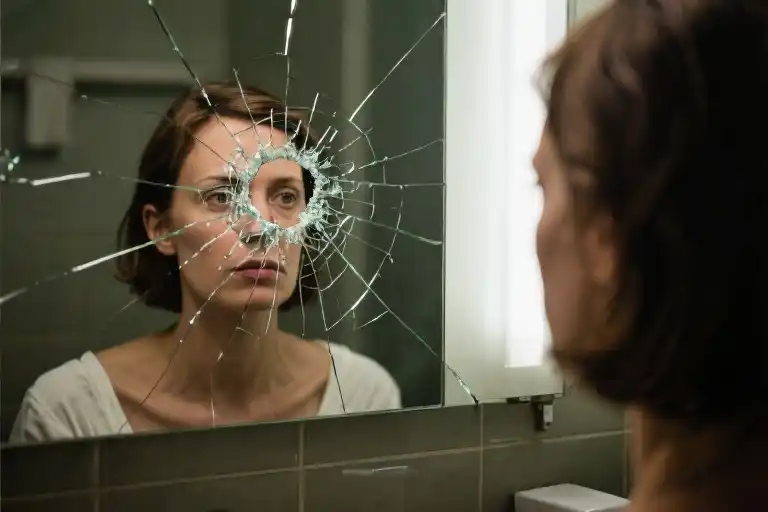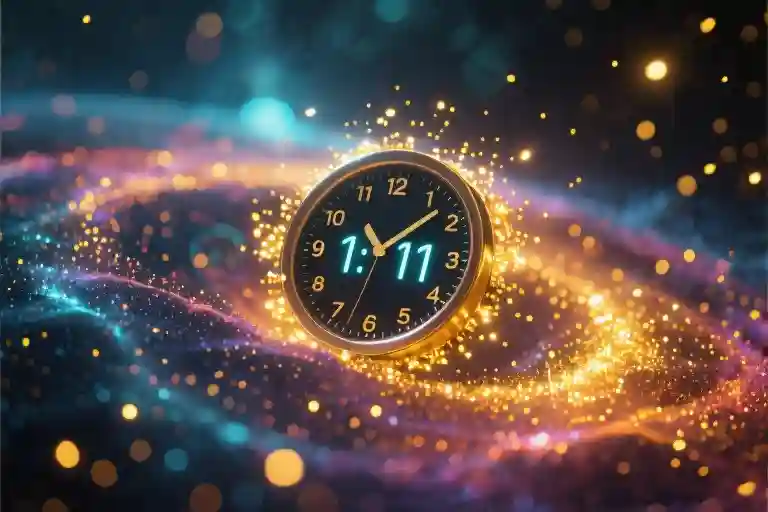The face in the bathroom mirror didn’t look like mine. Between 2013 and 2020, that reflection became a stranger—no, an enemy. I’d catch glimpses of it while brushing my teeth and feel my stomach twist. The eyes staring back seemed hollow, the mouth permanently set in disappointment. Some mornings I’d cover the mirror with a towel before daring to enter. Other times I’d catch my reflection in a store window and physically recoil, as if encountering something poisonous.
This wasn’t vanity. This was warfare. The mirror became ground zero for my self-hatred, a daily confrontation with everything I believed to be wrong about my existence. ‘Useless,’ the face would whisper. ‘Worthless.’ The words left mental bruises that lasted longer than any physical mark. I started avoiding photographs, deleting any accidental selfies immediately. My phone’s camera roll became a graveyard of half-deleted images where my face appeared for even a second.
The physical reactions surprised me most. Hands shaking when applying makeup. A metallic taste in my mouth when forced to confront my reflection in dressing rooms. Once, during particularly bad period, I actually scratched at a department store mirror—as if I could erase the image by sheer force. The sales associate gave me that particular blend of pity and alarm reserved for clearly unwell strangers.
What made it nuclear was how ordinary the triggers were. A casual glance at a bathroom mirror while washing hands. The black screen of a turned-off TV showing a distorted silhouette. These mundane moments became psychological landmines, each one reinforcing the same toxic narrative: you don’t deserve to occupy space. The reflection wasn’t just unflattering—it felt like visual proof of my fundamental brokenness.
Most people experience occasional self-doubt. This was different. This was my brain weaponizing every minor flaw, every past mistake, every imagined shortcoming into irrefutable evidence of worthlessness. The scary part? After enough repetitions, I stopped questioning it. The warped mirror lies started sounding like truth.
The Mirror War: When Reflections Become Horror
The bathroom mirror became my first battlefield. I developed elaborate rituals to avoid confronting that stranger who wore my face – draping towels over the glass, angling my body sideways when passing, sometimes pressing my palms against the surface until the image blurred into abstraction. On particularly bad days, I’d catch myself scratching at the reflection, as if I could peel away the offending visage like old wallpaper.
Self-loathing has its own vocabulary. Mine included mantras like ‘useless waste of oxygen’ and ‘disgusting parasite’ that played on loop behind my forehead. These weren’t passing thoughts but convictions etched into my neural pathways, each repetition deepening the grooves. The phrases took on physical weight – I could feel them like gravel in my mouth when I woke, like concrete shoes dragging me underwater by afternoon.
What startled me most were the physiological reactions. My hands would tremor when accidentally glimpsing a shop window reflection. Nausea coiled in my throat if I held eye contact with the mirror for more than two seconds. Sometimes the face would morph grotesquely – eyes sinking, skin bubbling, a real-time hallucination of how I imagined my rotten core must look. Psychiatrists call this body dysmorphia, but in those moments it felt like supernatural punishment, the mirror revealing some hidden truth everyone else politely ignored.
This wasn’t vanity. It was survival instinct gone haywire, my psyche treating its own reflection with the same fight-or-flight response others reserve for predators. I became an expert in reflection evasion – memorizing angles where glass wouldn’t catch me, developing sixth sense for shiny surfaces, turning family photos face down like they were contaminated. The cruel irony? This hypervigilance required constantly thinking about the very thing I was trying to escape.
Those years taught me that self-hatred isn’t an emotion but a total body experience. The racing heartbeat before opening a front-facing camera. The metallic taste when hearing my recorded voice. The way my shoulders hunched automatically, as if making my physical form smaller could minimize the space I undeservedly occupied in the world. Every avoided mirror was both a victory and a surrender – proof I was still fighting, and evidence the war was already lost.
The Mind Hijack: How Depression Rewires Your Self-Perception
The mirror wasn’t the problem. The problem was my brain had become a faulty editing suite, taking raw footage of my life and splicing it into a horror montage. You’re worthless appeared as bold subtitles across every mundane interaction. Failure became the background music to ordinary days.
Three particular cognitive distortions dominated this mental sabotage:
Overgeneralization turned single events into eternal truths. That one rejected job application didn’t mean I needed better interview skills – it proved I’d never be employable. The pattern spread like ink in water: I burned dinner → I ruin everything → I shouldn’t exist.
Emotional reasoning converted feelings into facts. The crushing weight in my chest wasn’t a symptom of depression – it became moral evidence: If I feel this guilty, I must deserve it. My physiological reactions served as their own indictment.
Personalization made me the gravitational center of all misfortune. A friend canceling plans had nothing to do with their busy life – clearly, they’d finally realized how toxic I was. Global events became personal condemnations; rainy days felt like nature’s commentary on my worth.
The cruel genius of depression lies in how convincing these distortions feel. They don’t arrive with warning labels or flashing signs saying This thought is inaccurate. They wear the clothes of truth, speaking in the familiar voice of your own mind.
I’m a financial burden felt like simple arithmetic when medical bills piled up, ignoring my parents’ repeated assurances. Nobody would miss me seemed logical during lonely nights, erasing years of friendship history. The disease doesn’t just distort your present – it rewrites your past and preemptively cancels your future.
What makes these thoughts particularly dangerous is their self-reinforcing nature. Each time you accept a distortion as truth, it strengthens the neural pathway that created it. The brain literally wears grooves into itself, making the next negative thought easier to access, more automatic to believe. It’s the neurological equivalent of a sled track on a snowy hill – the more you use it, the deeper it gets, the harder to climb out.
There were moments when reality tried breaking through. When my therapist would gently ask, What evidence supports that thought? The silence that followed was louder than any self-hatred. The absence of real proof should have been liberating, but in that mental state, it just felt like another failure – I couldn’t even justify my own suffering correctly.
This chapter isn’t about solutions. It’s about naming the invisible mechanisms that turned my mind against itself. There’s power in recognizing these patterns as symptoms rather than truths – not because it magically fixes them, but because it creates the tiniest gap between you and the thoughts. Enough space to whisper: This might not be real.
The Vicious Cycle: How Self-Hatred Feeds Depression
The mirror wasn’t the problem. My brain had become a hall of funhouse mirrors long before I stopped recognizing my reflection. What began as occasional self-doubt metastasized into full-blown self-loathing, and that’s when the real damage started. Depression warps perception, but self-hatred arms the distorted thoughts with nuclear warheads.
Science explains part of this nightmare. Every time I called myself ‘worthless,’ my cortisol levels spiked like a seismograph during an earthquake. That biochemical surge reinforced the neural pathways of self-criticism, making the insults feel increasingly true. Before long, my body reacted to my own thoughts like physical threats – racing heart, clammy hands, that leaden feeling in my limbs. The cruel irony? The more physiological distress I experienced, the more ‘evidence’ my depressed mind collected to prove I was fundamentally broken.
Social isolation crept in like fog. Canceling plans became automatic because I assumed friends merely tolerated me. Work suffered as concentration frayed under constant self-monitoring (‘Don’t screw up…you always screw up…’). Financial dependence on my parents twisted into psychological torture – each therapy bill another weight on the guilt scale. I constructed elaborate mental ledgers of my perceived debts and deficiencies, blind to how this accounting itself deepened the depression.
This feedback loop operates with terrifying efficiency. Negative self-talk triggers stress responses, which impair functioning, which ‘confirms’ the negative self-assessment. Like a snake swallowing its own tail, the cycle gains momentum until breaking free seems impossible. Even recognizing the pattern brought no relief initially – intellectual understanding couldn’t override years of conditioned self-attack.
What finally began shifting the dynamic wasn’t some dramatic breakthrough, but the accumulation of tiny moments when the cycle faltered. A therapist pointing out that my self-criticism followed predictable patterns. Noticing that the cortisol crash after self-hatred episodes left me exhausted, not ‘cleansed.’ Realizing my imagined burden on others paled beside the actual pain my withdrawal caused them. These weren’t lightning bolts of insight, just faint cracks in the hall of mirrors – but through them, glimmers of a less distorted reality began to appear.
The Gifts I Couldn’t See
There were days when breathing felt like stealing oxygen from worthier lungs. Years when mirrors weren’t reflective surfaces but accusation boards listing every flaw in flickering neon. Yet somehow, between 2013 and 2020, tiny victories were stacking up like invisible credits in some cosmic therapy account.
The shower test
For eighteen months, I’d shower with the bathroom mirror fogged or covered. Then one Tuesday, the towel slipped. Instead of the usual panic, there was a three-second pause where I simply noticed: The steam made my reflection look softer. No value judgment, just observation. It would take two more years before I could reliably do this.
The grocery receipt
At my worst, I’d tally every grocery item as a debt against my existence. But in 2017, I kept one receipt where I’d written ‘blueberries’ instead of ‘waste of money.’ The handwriting shook, but the cognitive shift was seismic.
The unsent apology
Self-loathing loves drafting imaginary apologies for crimes like ‘taking up space.’ In 2018, I wrote one and didn’t send it. The paper stayed in my drawer like a pardon letter from a jury that never existed.
The neutral description
Therapist homework: Describe your appearance without adjectives. ‘Brown hair, 5’6″, scar on left knee from age twelve.’ For the first time since childhood, I’d reported facts instead of verdicts.
The timekeeping
Marking a calendar with X’s for survived days felt cliché until I noticed the marks weren’t just about endurance. The spacing between breakdowns was stretching—two days, then four, then a whole week where the war paused.
Writing this now, I recognize what these moments really were: my brain’s immune system fighting back. Like white blood cells too small to see individually, their collective work only became visible in hindsight. Time didn’t heal me—it let these micro-rebellions compound.
The greatest proof isn’t that I recovered, but that I can recount this without romanticizing the pain. The mirror still isn’t my friend, but it’s no longer holding a loaded gun to my reflection either.
The Cracked Mirror: An Invitation to Your Story
That question lingers like condensation on a bathroom mirror after a hot shower – if the glass itself was warped from the beginning, what does that say about every reflection we’ve ever hated? For years I attacked the distorted image without ever questioning the mirror’s integrity. The realization didn’t come as some dramatic epiphany, but through accumulated moments of noticing how differently others saw me.
Here’s what I wish someone had told me during those mirror-avoiding years: self-hatred thrives in isolation. When we lock our shame away, it grows fangs. That’s why I’m asking you to consider something terrifyingly simple – would you describe your mirror war to someone who truly understands? Not the sanitized version, but the raw details: how you hold your breath passing reflective surfaces, the specific insults whispered to your reflection, that visceral recoil when photos tag you unexpectedly.
There’s power in externalizing what feels unspeakable. Like pressing your palm against cold glass to prove the barrier exists. You might discover, as I did, that the self-loathing script loses potency when exposed to air. Or you might not – and that’s okay too. This isn’t about fixing, but about being witnessed without judgment.
If you’re willing, here’s a way to start (copy and adjust as needed):
“When I look in the mirror, I don’t see a person – I see . The worst moment was when . What nobody knows is that I . Lately I’ve noticed .”
No advice. No pep talks. Just your truth, however messy, however unfinished. Because the most radical act might be looking at your reflection and saying: this story isn’t over yet.





